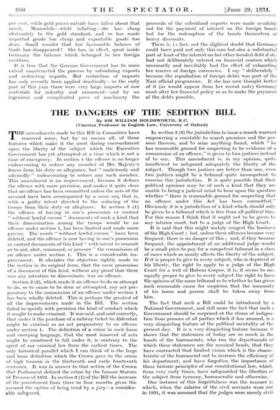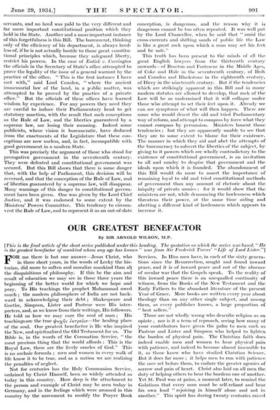THE DANGERS OF THE SEDITION BILL
By SIR WILLIAM HOLDSWORTH, K.C. (Vinerian Professor in English Law, University of Oxford)
THE amendments made to this Bill in Committee have removed some, but by no means all, of those features which make it the most daring encroachment upon the liberty of the subject which the Executive Government has yet attempted at a time which is not a time of emergency. In section 1 the offence is no longer endeavouring to seduce any member of His Majesty's forces from his duty or allegiance, but " maliciously and advisedly " endeavouring to seduce any such member. This amendment is an improvement, because it defines the offence with more precision, and makes it quite clear that no offence has been committed unless the acts of the accused have been accompanied by a mess reit, that is, with a guilty intent directed to the seducing of the troops from their duty or allegiance. In section 2 (1) the offence of having in one's possession or control " without lawful excuse " documents of such a kind that their dissemination among the troops would be an offence under section 1, has been limited and made more precise. The words " without lawful excuse " have been deleted, and the offence is now having in one's possession or control documents of this kind " with intent to commit or to aid, abet, command, or procure " the commission of an offence under section 1. This is a considerable im- provement. It obviates the objection rightly made to the section in its original form, that the mere possession of a document of this kind, without any proof that there was any intention to disseminate, was an offence.
Section 2 (2), which made it an offence to do or attempt to do, or to cause to be done or attempted, any act pre- paratory to the commission of an offence under section 1 has been wholly deleted. This is perhaps the greatest of all the improvements made in the Bill. The section failed to specify with precision the kind of conduct which it sought to make criminal. It was said, and said correctly, that under it the purchase of a railway ticket to Aldershot might be criminal as an act preparatory to an offence under section 1. The definition of a crime in such loose and sweeping language, that the most innocent of acts might be construed to fall under it, is contrary to the spirit of our criminal law from the earliest times. The only historical parallel which I can think of is the large and loose definition which the Crown gave to the crime of high treason in the _thirteenth and early fourteenth centuries. It was in answer to that action of the Crown that Parliament defined the crime by the famous Statute of Treason of 1352. In section 3 (1) of the Bill the increase of the punishment from three to four months gives the accused the option of being tried by a jury—a consider- able safeguard. In section 2 (3) the jurisdiction to issue a search warrant empowering a constable to search premises and the per- sons thereon, and `to seize anything found, which " he has reasonable ground for suspecting to be evidence of a commission of an offence," is given to two justices instead of to one. This amendment is, in my opinion, quite insufficient to safeguard adequately the liberty of the subject. Though two justices are better than one, even two justices might be a tribunal quite incompetent to exercise this jurisdiction. It is quite possible that their political opinions may be of such a kind that they are unable to bring a judicial mind to bear upon The question whether " there is reasonable ground for suspecting that an offence under this Act has been committed." Obviously it is a jurisdiction of a kind which should only be given to a tribunal which is free from all political bias. For this reason I think that it ought not to be given to any inferior court, but to a judge of the High Court.
It is said that this might unduly congest the business of the High Court ; but, unless these offences became very frequent, there is no danger of this ; and, if they became frequent, the appointment of an additional judge would be a small price to pay for a competent tribunal in a class of cases which so nearly affects the liberty of the subject. If it is proper to give to every subject, who is deprived of his liberty, the right to apply to a judge of the High Court for a writ of Habeas Corpus, it is, it seems to me, equally proper to give to every subject the right to have the opinion of the same tribunal as to whether he has given such reasonable cause for suspicion that the immunity of his home and person shall be taken away from him.
The fact that such a Bill could be introduced by a National Government, and still more the fact that such a Government should be surprised at the storm of indigna- tion from persons of all parties which it has aroused, is a very disquieting feature of the political mentality of the present day. It is a very disquieting feature because it shows that the statesmen of today are so much in the hands of the bureaucrats, who run the departments of which these statesmen are the nominal heads, that they have contracted that limited vision which is the charac- teristic of the bureaucrat out to increase the efficiency of his department, and have forgotten the importance of those historic principles of our constitutional law, which, from very early times, have safeguarded the liberties of the subject from tyranny, bureaucratic and otherwise..
One instance of this forgetfulness was the manner in which, when the salaries of the civil servants were cut in 1931, it was assumed that the judges were merely civil servants, and no heed was paid to the very. different and far more important constitutional position which they hold in the State. Another and a more important instance of this forgetfulness is this Bill. The bureaucrat, thinking only of the efficiency of his department, is always heed- less of, if he is not actually hostile to those great constitu- tional principles which, because they safeguard liberty, restrict his powers. In the case of Entick v. Carrington the officials in the Secretary of State's office attempted to prove the legality of the issue of a general warrant by the practice of the office. " This is the first instance I have met with," said Lord Camden, " where the ancient immemorial law of the land, in a public matter, was attempted to be proved by the practice of a private office." But the officials of these offices have learned wisdom by experience. For any powers they need they are careful to induce their Parliamentary head to get statutory sanction, with the result that such conceptions as the Rule of Law, and the liberties guaranteed by a supreme law, are losing their meaning. Indeed some publicists, whose vision is bureaucratic, have deduced from the enactments of the Legislature that these con- ceptions are now useless, and, in fact, incompatible with good government in a modern State.
This was precisely the argument of those who stood for prerogative government in the seventeenth century. They were defeated and constitutional government was secured. But this Bill shows that there is some danger that, with the help of Parliament, this decision will be reversed, and that the conception of the Rule of Law, and of liberties guaranteed by a supreme law, will disappear. Many warnings of this danger to constitutional govern- ment have been given. One was given by the Lord Chief Justice, and it was endorsed to some extent by the Ministers' Powers Committee. This tendency to circum- vent the Rule of Law, and to represent it as an out-of-date conception, is dangerous, and the reason why it is dangerous cannot be too often repeated. It was well put by the Lord Chancellor, when he said that " amid the cross-currents and shifting sands of public life the Law is like a great rock upon which a man may set his feet and be safe."
This truth has been present to the minds of all the great English lawyers from the thirteenth century onwards—of Bracton and Fortescue in the Middle Ages, of Coke and Hale in the seventeenth century, of Holt and Camden and Blackstone in the eighteenth century, of Dicey in the nineteenth century. But if the tendencies which are strikingly apparent in this Bill and in many modern statutes are allowed to develop, that rock of the Law will be so undermined that it will collapse under those who attempt to set their feet upon it. Already we can see symptoms of what will then happen. There are some who would desert the old and tried Parliamentary way of reform, and attempt to compass by force what they cannot compass by persuasion. Ministers lament those tendencies ; but they arc apparently unable to see that they are to some extent to blame for their existence. The manner in which they aid and abet the attempts of the bureaucracy to subvert the liberties of the subject, by giving to it powers which are wholly contradictory to the existence of constitutional government, is an invitation to all and sundry to despise that government and the ideals upon which it is founded. The abandonment of this Bill would do more to assert the importance of remaining loyal to old and tried constitutional methods of government than any amount of rhetoric about the iniquity of private armies ; for it would show that the ministers are not, while denouncing the lawlessness which threatens their power, at the same time aiding and abetting a different kind of lawlessness which appears to increase it.





































 Previous page
Previous page